|
|
|
Sort Order |
|
|
|
Items / Page
|
|
|
|
|
|
|
| Srl | Item |
| 1 |
ID:
183793


|
|
|
|
|
| Summary/Abstract |
In The Abandonment of the West, Michael Kimmage explores the relationship between American foreign policy and the ‘West’. The concept of the West, once a unifying idea in American culture, has undergone a sharp re-evaluation over the last century. Kimmage does not idealise the West or its history, giving a voice to the many critics of Western civilisation who have pointed out examples of US hypocrisy. At the same time, he notes that the West, especially in its heyday, accomplished great things, and he cautions against its wholesale abandonment – particularly at a time when the US and its allies are facing a host of domestic and international challenges.
|
|
|
|
|
|
|
|
|
|
|
|
|
|
|
|
| 2 |
ID:
183789
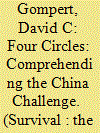

|
|
|
|
|
| Summary/Abstract |
Policymakers need a broad and durable framework for clearly assessing the challenges posed by China, setting priorities for dealing with them and developing effective and consistent responses and initiatives. This article offers a framework derived from Chinese leaders’ long-standing quest for control. It consists of four concentric circles, from China’s domestic order in the centre, where its pursuit of control is strongest, to its conception of an alternative to the US-led liberal international order in the outermost circle, where it is weakest. The second circle encompasses lands and waters that the Chinese consider unambiguously theirs, especially Taiwan and the South China Sea. The third is the Asia-Pacific region writ large, where China means to replace the United States as the leading power. Because these two circles encompass important, if not vital, US interests and obligations, yet are fixed in China’s geopolitical agenda, the potential for conflict within them is especially high.
|
|
|
|
|
|
|
|
|
|
|
|
|
|
|
|
| 3 |
ID:
183790
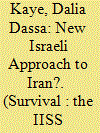

|
|
|
|
|
| Summary/Abstract |
Israeli Prime Minister Naftali Bennett’s cordial relations with the Biden administration and relatively muted posture during nuclear negotiations in Vienna raise questions about whether his government is pursuing a different strategy towards Iran than did his predecessor, Benjamin Netanyahu. This article argues that it is not. Despite reinvigorated Israeli debates critical of Netanyahu’s policies and improved atmospherics with the American government, official Israeli policy remains essentially unchanged. The Israeli government is still wary of nuclear diplomacy, offers few alternatives to continued diplomatic and economic pressure, and views military options as viable even if they can only set back Iran’s nuclear programme temporarily. While Bennett wants to avoid open confrontation with Washington, Israel will not relax tensions with Iran, particularly in non-nuclear arenas like Syria. In the past, Israeli sabotage against Iran’s nuclear assets subsided in the run-up to and after the nuclear agreement; this time around, Israel may not feel so constrained.
|
|
|
|
|
|
|
|
|
|
|
|
|
|
|
|
| 4 |
ID:
183786
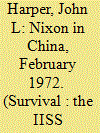

|
|
|
|
|
| Summary/Abstract |
When Richard M. Nixon became president in 1969, US–China relations had been frozen for 20 years. Nixon was well positioned to transform those relations: he enjoyed the confidence of US conservatives, and no one could reasonably accuse him of sympathising with communism. He had developed a realist world view that minimised the importance of ideology and of a state’s domestic system. The time was right for a new approach because China and the Soviet Union had come to see each other as deadly enemies. The US was bogged down in Vietnam and urgently in need of a relaxation of external pressure. Nixon’s visit to China in February 1972 initiated a process of normalisation and a shift in the international power balance decisively in favour of the West. But Nixon did not foresee China’s transformation along democratic lines and considered it a greater threat than the Soviet Union over the long run.
|
|
|
|
|
|
|
|
|
|
|
|
|
|
|
|
| 5 |
ID:
183791
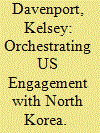

|
|
|
|
|
| Summary/Abstract |
North Korea’s advancing nuclear-weapons programme poses a significant threat to US security interests, yet successive US presidents have failed to roll back this threat. The Trump administration’s failed negotiations with North Korea demonstrated that narrowly construed negotiating strategies requiring Pyongyang to take concrete steps towards denuclearisation prior to receiving any benefits are partly to blame for the lack of progress. A more productive strategy would embed verifiable steps towards denuclearisation within a broader transformation of the relationship between Washington and Pyongyang. Such a strategy would begin with an agreement between the United States and North Korea on a broad framework for denuclearisation and peacebuilding that would guide corresponding actions by both parties to achieve these goals.
|
|
|
|
|
|
|
|
|
|
|
|
|
|
|
|
| 6 |
ID:
183784
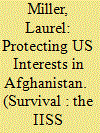

|
|
|
|
|
| Summary/Abstract |
It is unrealistic to expect the Taliban regime to provide Afghanistan with a representative government that respects human rights in line with American preferences, or to constitute a strong security partner for the United States. But Washington still has choices about the relationship it can have with Kabul. The US government should move beyond its post-withdrawal hybrid policy of isolation and limited engagement – essentially, no relationship beyond occasional ad hoc problem-solving – to one that is better able to protect US interests in the region. These include preventing Afghanistan from becoming a base for transnational terrorist groups, securing the departure of Afghans at risk due to their association with the US occupation, and tamping down anti-Western sentiment. A bilateral relationship that establishes routine US diplomatic engagement, a development-assistance programme and tailored sanctions is required.
|
|
|
|
|
|
|
|
|
|
|
|
|
|
|
|
| 7 |
ID:
183782
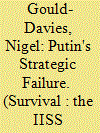

|
|
|
|
|
| Summary/Abstract |
Russian President Vladimir Putin’s invasion of Ukraine was a grand strategic error. He underestimated Ukraine’s cohesion and will to resist, the West’s unity and resolve, the vehemence of Russia’s domestic opposition and the wariness of Russian elites. While Putin’s resort to war reflected Russia’s limited options for trying to halt Ukraine’s drift away from its remaining pull, the war itself has shattered myths about Russia’s own strength. It has exposed economic vulnerability, serious failures of military planning and battlefield execution, and deficits in information and cyber warfare. Mooted compromises involving Ukraine’s partition or neutrality do not yet feel like stable solutions whose terms all sides will accept. Parallel escalation by Russia and the West appears to be the prevailing dynamic. But even if Russia out-escalates the West, the costs of victory will be very large, not least on the home front.
|
|
|
|
|
|
|
|
|
|
|
|
|
|
|
|
| 8 |
ID:
183788
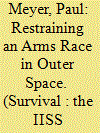

|
|
|
|
|
| Summary/Abstract |
The world is faced with an escalating arms race in outer space at the very time that this vital, if vulnerable, environment is experiencing rapid growth in orbiting satellites and the array of services they provide. After years of relative stagnation, multilateral diplomatic activity is being re-energised, spurred by the revival of debris-causing anti-satellite weapons (ASAT) tests. A British initiative has resulted in the creation of a new United Nations diplomatic forum on ‘Reducing Space Threats Through Norms, Rules and Principles of Responsible Behaviours’. Although geopolitical tensions between leading space powers make the development of cooperative security arrangements difficult, there is a common interest in avoiding the creation of more space debris that would endanger the assets of all space operators.
|
|
|
|
|
|
|
|
|
|
|
|
|
|
|
|
| 9 |
ID:
183787


|
|
|
|
|
| Summary/Abstract |
This article addresses the relationship between the practice of arms control in the 1970s and strategic theory. Although the 1972 Anti-Ballistic Missile Treaty is often described as an example of theory-directed arms control, this article shows that ballistic-missile defences were a poor investment because of the ease with which they could be overwhelmed by offensive systems, especially with multiple warheads. The Nixon administration constructed a rationale for anti-ballistic missiles based on the need to defend against a partial surprise attack directed against American intercontinental ballistic missiles. When the negotiations succeeded and the investment stopped, the rationale remained, leaving an exaggerated problem without an easy solution. Meanwhile, parallel efforts to impose limits on offensive systems had the effect of encouraging a weak strategic theory emphasising the importance of perceptions of numerical comparisons.
|
|
|
|
|
|
|
|
|
|
|
|
|
|
|
|
| 10 |
ID:
183785


|
|
|
|
|
| Summary/Abstract |
Since South Korea announced its plan to build an aircraft carrier, the country’s politicians, defence analysts and opinion leaders have engaged in heated debate. Supporters argue that Seoul’s new carrier will provide better protection of South Korea’s maritime interests and serve as a more credible deterrent against North Korea. Critics have raised concerns about the carrier’s cost, its strategic utility and the risk of entanglement in a US–China confrontation. The fate of South Korea’s carrier programme is likely to be determined by its level of parliamentary support, the outcome of the country’s presidential election and Seoul’s grand strategy.
|
|
|
|
|
|
|
|
|
|
|
|
|
|
|
|
| 11 |
ID:
183792
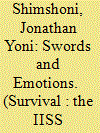

|
|
|
|
|
| Summary/Abstract |
State and non-state actors, from Hizbullah and the Islamic State (ISIS) to Russia and China, challenge Western nations with society-centric strategies. These employ wide-ranging tools – military force, economics, cyber and information – mainly to manipulate their rival societies’ collective emotions and hence their behaviour. Western countries have not always performed well in response, and a better understanding of such warfare and strategy is imperative. This article explores the American Civil War as an exemplary case of society-centric warfare. It analyses the Union’s coercive and conciliatory efforts to impact Southern collective emotions and behaviour, and the errors that drove counterproductive and escalatory results. It points to two aspects of a rival society that must be correctly assessed for effective society-centric strategy: its collective psychological predispositions – ethos, long-term sentiments and framing of the conflict – and its political culture and economy. It also points to universal psychological dynamics that must be accounted for when devising such strategy.
|
|
|
|
|
|
|
|
|
|
|
|
|
|
|
|
| 12 |
ID:
183783
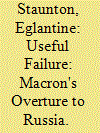

|
|
|
|
|
| Summary/Abstract |
Throughout his presidency, French President Emmanuel Macron has promoted a rapprochement between the European Union and Russia. He conceived it as a means to two ends: the strengthening of the EU and the protection of what he has referred to as ‘European civilisation’. Russia’s invasion of Ukraine has shown that Macron’s gamble has failed. As a result, some adjustments to Macron’s foreign policy with respect to Russia are necessary and under way. Other aspects of his European policy, however, remain sensible and more relevant than ever.
|
|
|
|
|
|
|
|
|
|
|
|
|
|
|
|
|
|
|
|
|